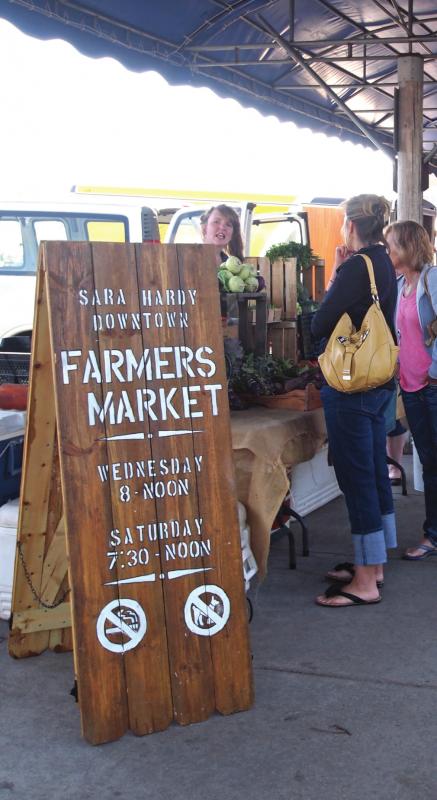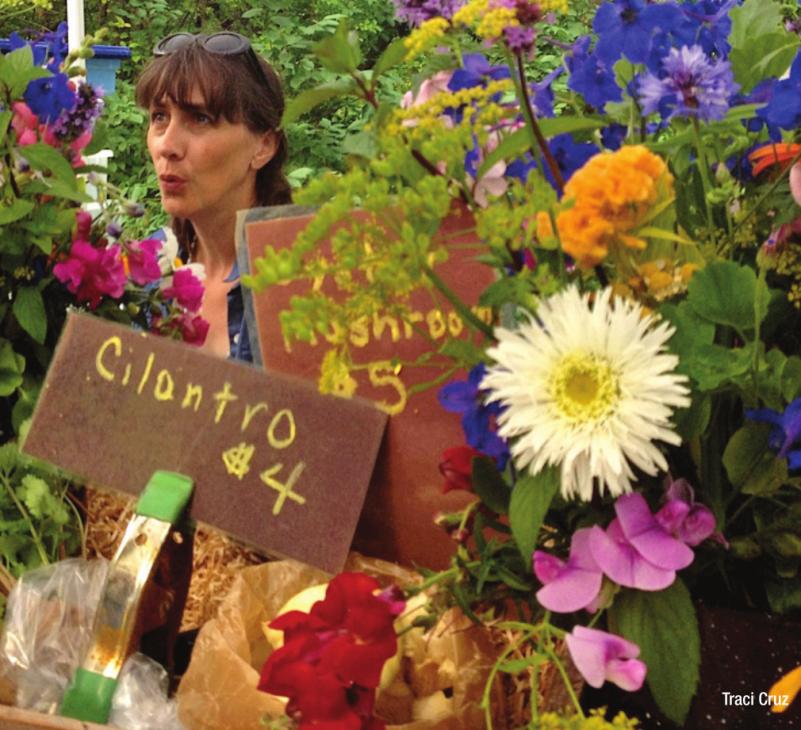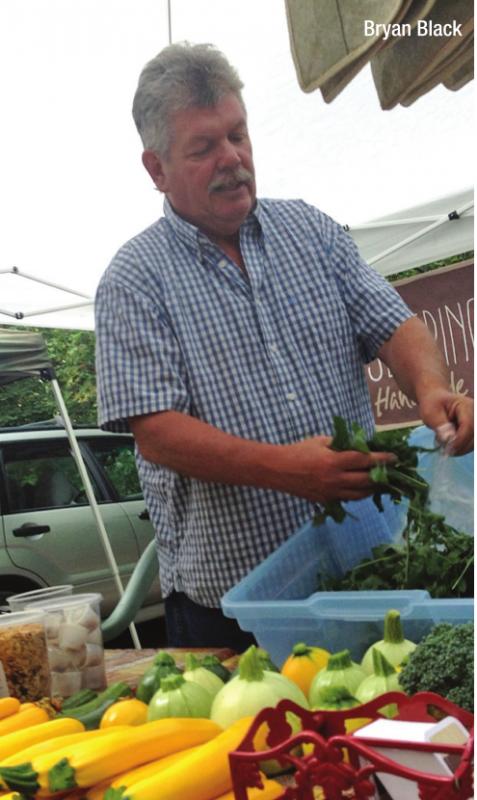Turf Wars
The farmers market life is getting tougher for growers reselling produce
Aug. 3, 2014

A turf war is simmering in local farmers markets over exactly where that cherry, tomato, or radish was picked.
Some say the argument is just splitting hairs; others decry the trucked-in produce as undercutting the small local grower.
Many farmers believe rules that require food to be local should be strictly enforced at the markets. They say sellers who resell fruits and vegetables from downstate, where the harvest is often weeks earlier, hurt their business.
Some growers – including one who has been kicked out of the downtown Traverse City farm market – believe there is nothing wrong with supplementing their harvest with other food because it gives customers what they want.
RESELLERS DON’T HAVE RISK
The turf battle has led to confrontations between vendors, the establishment of rules at some markets and investigations that sometimes include a market manager visiting a farm to ensure the crops are grown where the farmer says they are.
Bryan Black, who runs Platte River Gardens and Sleeping Bear Granola with his wife, Karla, said many farmers are passionate about rooting resellers from the markets.
"They don’t have to take any risk," he said. "They don’t have to buy seed or worry about the weather."
Black is a boutique farmer. He grows on three-quarters of an acre and he’s developing another one.
"That’s all one person can handle," he said lack would like to see markets adopt certified growers programs so each vendor could be vetted.
That way, customers could be assured that there’s no repackaged, wholesale food for sale.
Black and his wife hope to organize a group of growers called "Real Farmers of Northwest Michigan" so that customers can recognize guaranteed local growers.
BIG GUY V. LITTLE GUY
The dispute is more about big farmers versus little farmers than local versus out-of-area food, said Jim Riley of Blue Patch Farms in Kingsley.
Riley supplements the fruit and vegetables he sells at farmers markets with food from other growers.
He said he knows the farmers that grow the food and it all comes from Michigan.
"We sell in such volume that we cannot produce what we sell," Riley said. "The bottom line is we have a customer base that goes well beyond farmers markets."
Riley said Blue Patch sells 100,000 pounds of blueberries every year.
Selling others’ food has gotten him in hot water at the Sara Hardy Downtown Farmers Market in Traverse City, where Riley was told he needed to resubmit an application before he could sell at the market again.
"Their problem is that because we’re not growing at the address listed in the application, then we’re in violation of the market rules," Riley said. "This is a Catch 22: "˜We’re not banning you from the market, but you can’t come back until you file another application "¦ and we’re putting you on the bottom of the list.’"

CALIFORNIA
ORGANIC PRODUCE
Riley believes he was singled out at Sara Hardy. He claims small growers get away with selling stuff they don’t grow.
"I go in there and I literally see vendors with boxes of California organic produce," Riley said. "They’re buying them from a wholesaler and they’re bringing them in from California."
He said the market manager looks the other way. Nick Viox, market master for Sara Hardy, begs to differ.
"That’s not true," he said. "If there’s a [suspicion], we do have complaint forms that all of our vendors are welcome to fill out."
He said all complaints are investigated. Viox said if he saw evidence of out-of-state food, he would file a complaint himself.
RULES AND REGS
This is the first year the "no reselling" rule has been in effect at Sara Hardy.
It means vendors must grow or produce all of what’s for sale on their table; they have to display a sign that says what county the products come from; and everything has to be from Michigan.
When space is limited, preference is given to the five counties around Traverse City.
The local food rule may be new, but that’s been the point of a farmers market since they started.
"It was just solidifying what we already had," Viox said. "The rules weren’t really a drastic change."
TRUCKLOADS FROM SAM’S CLUB 
Viox said the rules have not uncovered the much talked about "phantom" vendors who arrive with bulk produce from Meijer.
"I always hear these horror stories, people saying they’re seeing people coming with truckloads of stuff from Sam’s Club," he said. "I have never seen that."
Viox said there have been two complaints this year that led to farm visits. One of the complaints was proven to be unfounded. The second was Blue Patch Farms. Viox believes most sellers appreciate the rules.
"I think the rules have worked out pretty well in our favor," he said. "The vendors, they really like it being a growers’ market."
SOME STRICTER THAN OTHERS
Some markets limit the amount of products resold to 20 percent.
Others bar outside food altogether. Reselling is not allowed at the Charlevoix Farmer’s Market, held Thursdays at East Park.
"In our rules, we don’t allow it," said market manager Chris Leese. "We monitor everything. They have to sign an agreement. They have to say, "˜Yes,’ to not being a reseller."
Vendors must pledge that their food comes from Charlevoix, Antrim, Emmet, Otsego or Cheboygan counties.
Leese is confident that what’s sold at her market comes from those counties.
"There’s always questions that come up, you know, "˜Can I add whatever, if it didn’t come from this five-county area?’" she said.
"Then the answers is "˜No.’" Judy Emmons, market manager of the Made in Michigan Farmers Market in Cadillac, said her market allows up to 20 percent of a vendor’s product to be from other farms. She said that policy was adopted to ensure a variety of products would be available.
HOW TO TELL LOCAL
For customers who want to ensure they are getting food straight from the farmer, often the easiest thing to do is ask the person behind the table.
"Ask when you’re purchasing," Emmons said. "When you’re asking that question, unless the person’s really good at lying, you get a really good feeling, I think."
That’s not always true, though. "Everybody tells you, "˜Well, we grew it,’" said Bud Phillips of Bud’s Pure Maple in Mesick. "I’ve been by some of the places that say they grow it and there’s nothing there. It’s just filled with weeds."
Phillips said he knows some growers who must buy 90 percent of their stuff. They take a panel truck downstate and they come back loaded up and ready to go.
"They tell the people that they grow it themselves," he said.
Phillips is most bothered by people who compete with him with bulk syrup.
"If they’re getting maple syrup, they buy it by the pound at wholesale prices and then they bottle it themselves and put their name on the jug," he said. "You can order it from Vermont from these huge producers from Quebec. You can get it by 55 gallon drums."
Traci Cruz, a fruits and vegetable vendor from Empire who helped establish the Leelanau Farmers Market in Glen Arbor a decade ago, said customers should consider what’s in season when they go to a market.
"If people come in May and see red, ripe tomatoes, people are like, "˜Oh, I can get tomatoes any time,’" she said. "No, it doesn’t work that way."
Trending

The Valleys and Hills of Doon Brae
Whether you’re a single-digit handicap or a duffer who doesn’t know a mashie from a niblick, there’s a n... Read More >>
The Garden Theater’s Green Energy Roof
In 2018, Garden Theater owners Rick and Jennie Schmitt and Blake and Marci Brooks looked into installing solar panels on t... Read More >>
Earth Day Up North
Happy Earth Day! If you want to celebrate our favorite planet, here are a few activities happening around the North. On Ap... Read More >>


